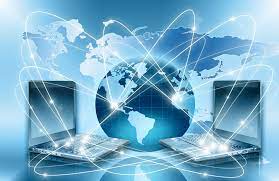The Internet: A Gateway to Boundless Information and Connectivity
Since its inception, the internet has revolutionized the way we communicate, access information, conduct business, and entertain ourselves. It serves as a vast virtual network that connects people from all corners of the globe, transcending geographical boundaries and time zones.
One of the most remarkable aspects of the internet is its role as a repository of knowledge. With just a few keystrokes, users can access a wealth of information on virtually any topic imaginable. From academic research to DIY tutorials, from news updates to entertainment content, the internet offers a treasure trove of resources at our fingertips.
Besides being an invaluable source of information, the internet also serves as a powerful tool for communication and connectivity. Email, social media platforms, instant messaging services – these digital channels have transformed the way we interact with one another, enabling real-time communication regardless of distance.
Moreover, the internet has reshaped industries and economies worldwide. E-commerce has flourished with online shopping becoming increasingly popular. Businesses leverage digital marketing strategies to reach wider audiences and engage with customers in innovative ways. Remote work has become more prevalent, allowing individuals to collaborate across borders without physical constraints.
However, along with its myriad benefits, the internet also poses challenges such as cybersecurity threats, privacy concerns, and misinformation dissemination. As we navigate this digital landscape, it becomes imperative to exercise caution, critical thinking, and responsible online behavior.
In conclusion, the internet stands as a testament to human ingenuity and innovation. It continues to evolve and shape our lives in profound ways. Embracing its potential while being mindful of its pitfalls is key to harnessing the full power of this remarkable technology.
Top 5 Benefits of the Internet: Information, Communication, Shopping, Remote Work, and Community Connection
- Instant access to a vast amount of information on any topic.
- Facilitates seamless communication with people worldwide through various platforms.
- Enables convenient online shopping and access to a wide range of products and services.
- Provides opportunities for remote work and flexible employment arrangements.
- Empowers individuals to express themselves, share ideas, and connect with like-minded communities.
Six Major Drawbacks of Internet Usage: From Cybersecurity to Digital Inequality
- Cybersecurity threats such as hacking, malware, and phishing pose risks to personal data and sensitive information.
- Online privacy concerns arise due to data collection practices by companies and the potential for surveillance by governments.
- The spread of misinformation and fake news on the internet can lead to confusion, distrust, and social division.
- Excessive screen time and internet addiction can have negative impacts on mental health, productivity, and real-world relationships.
- Online harassment, cyberbullying, and trolling contribute to a toxic online environment that can harm individuals emotionally and psychologically.
- Digital divide disparities in internet access create inequalities in education, employment opportunities, and access to essential services.
Instant access to a vast amount of information on any topic.
The internet offers an unparalleled advantage in providing instant access to a vast amount of information on any topic imaginable. With just a few clicks, users can delve into a wealth of knowledge, from academic research and historical facts to practical guides and creative inspiration. This accessibility not only facilitates learning and personal growth but also fosters curiosity and exploration. The ability to quickly find information on diverse subjects empowers individuals to expand their horizons, stay informed, and engage with the world in a more informed and enlightened manner.
Facilitates seamless communication with people worldwide through various platforms.
The internet serves as a powerful enabler of global communication, facilitating seamless interaction with individuals across the world through a diverse array of platforms. From email and instant messaging to social media networks and video conferencing tools, the internet transcends geographical barriers and time zones, allowing for real-time connectivity and collaboration on a scale never before possible. This unparalleled access to global communication platforms has revolutionized how we engage with others, fostering connections, sharing ideas, and building relationships regardless of physical distance.
Enables convenient online shopping and access to a wide range of products and services.
The internet facilitates convenient online shopping by providing access to a vast array of products and services at our fingertips. With just a few clicks, consumers can browse through countless online stores, compare prices, read reviews, and make purchases from the comfort of their homes. This accessibility not only saves time and effort but also opens up a world of options that may not be available locally. From niche products to international brands, the internet broadens shopping horizons and offers unparalleled convenience in fulfilling our needs and desires.
Provides opportunities for remote work and flexible employment arrangements.
The internet has revolutionized the way we work by providing opportunities for remote work and flexible employment arrangements. This pro allows individuals to collaborate with teams, attend meetings, and complete tasks from anywhere in the world, offering a level of flexibility and work-life balance previously unattainable. Remote work not only benefits employees by eliminating commute time and offering a more comfortable work environment but also enables employers to tap into a global talent pool and reduce overhead costs associated with traditional office spaces. The internet’s role in facilitating remote work has transformed the modern workforce, paving the way for a more agile and adaptable approach to employment.
Empowers individuals to express themselves, share ideas, and connect with like-minded communities.
The internet empowers individuals to express themselves freely, share their ideas with a global audience, and connect with like-minded communities effortlessly. Through social media platforms, online forums, and blogging websites, people can voice their opinions, showcase their creativity, and engage in meaningful discussions with others who share their interests and passions. This digital connectivity fosters a sense of belonging and camaraderie among individuals who may be geographically distant but united by common values or hobbies. The internet serves as a virtual space where diverse voices can be heard, ideas can be exchanged, and relationships can be forged, enriching the fabric of our interconnected world.
Cybersecurity threats such as hacking, malware, and phishing pose risks to personal data and sensitive information.
Cybersecurity threats, including hacking, malware, and phishing, present a significant con of the internet as they jeopardize the security of personal data and sensitive information. Hackers exploit vulnerabilities in online systems to gain unauthorized access to private data, while malware can infect devices and compromise their functionality. Phishing attacks trick individuals into divulging confidential information through deceptive means. These threats highlight the importance of robust cybersecurity measures to safeguard against potential breaches and protect one’s digital identity and privacy in an increasingly interconnected online world.
Online privacy concerns arise due to data collection practices by companies and the potential for surveillance by governments.
Online privacy concerns have become a pressing issue as companies increasingly collect and utilize user data for various purposes, often without explicit consent. The pervasive tracking of online activities raises alarm about the protection of personal information and the potential for data breaches. Moreover, the specter of government surveillance looms large, with fears of encroachment on individual liberties and privacy rights in the digital realm. As we navigate the complexities of the internet age, safeguarding our online privacy against intrusive data collection practices and governmental surveillance emerges as a critical challenge that demands attention and proactive measures to ensure data security and user confidentiality.
The spread of misinformation and fake news on the internet can lead to confusion, distrust, and social division.
The proliferation of misinformation and fake news on the internet poses a significant conundrum, fostering confusion, eroding trust, and fueling societal rifts. In an era where information spreads rapidly and unchecked online, individuals are susceptible to being misled by deceptive content masquerading as truth. This phenomenon not only undermines the credibility of legitimate sources but also sows seeds of doubt and discord among communities. The repercussions of this rampant dissemination of falsehoods can be far-reaching, perpetuating a climate of uncertainty and division that challenges the very fabric of a well-informed and cohesive society.
Excessive screen time and internet addiction can have negative impacts on mental health, productivity, and real-world relationships.
Excessive screen time and internet addiction can have detrimental effects on individuals’ mental well-being, productivity levels, and real-world relationships. Spending prolonged hours glued to screens can lead to feelings of isolation, anxiety, and depression. Moreover, constant digital engagement may hinder one’s ability to focus, leading to decreased productivity and performance in daily tasks. Additionally, excessive internet use can strain real-world relationships as individuals prioritize virtual interactions over face-to-face connections, resulting in a sense of disconnection and detachment from those around them. It is crucial to strike a balance between online activities and offline engagements to safeguard mental health, enhance productivity, and nurture meaningful relationships in the physical world.
Online harassment, cyberbullying, and trolling contribute to a toxic online environment that can harm individuals emotionally and psychologically.
Online harassment, cyberbullying, and trolling are insidious facets of the internet that perpetuate a toxic online environment, posing significant harm to individuals emotionally and psychologically. The anonymity and distance afforded by the digital realm often embolden perpetrators to engage in hurtful behavior without facing immediate consequences. Victims of such online abuse may experience profound distress, anxiety, and feelings of isolation as they navigate this hostile virtual landscape. The pervasive nature of online harassment underscores the importance of promoting digital empathy, fostering respectful discourse, and implementing measures to combat cyberbullying for a safer and more inclusive online community.
Digital divide disparities in internet access create inequalities in education, employment opportunities, and access to essential services.
The digital divide, characterized by disparities in internet access, engenders a troubling landscape of inequality across various spheres. In education, students lacking reliable internet connectivity are at a disadvantage, unable to fully engage in online learning resources and falling behind their peers. This gap extends to employment opportunities, where individuals without adequate internet access may struggle to access job listings, participate in virtual interviews, or acquire necessary digital skills for modern workplaces. Moreover, limited internet access hinders individuals from accessing essential services such as telemedicine, online government services, and e-commerce platforms, exacerbating existing socio-economic disparities and perpetuating a cycle of inequity. Addressing these digital disparities is crucial in ensuring equitable access to opportunities and services for all members of society.




